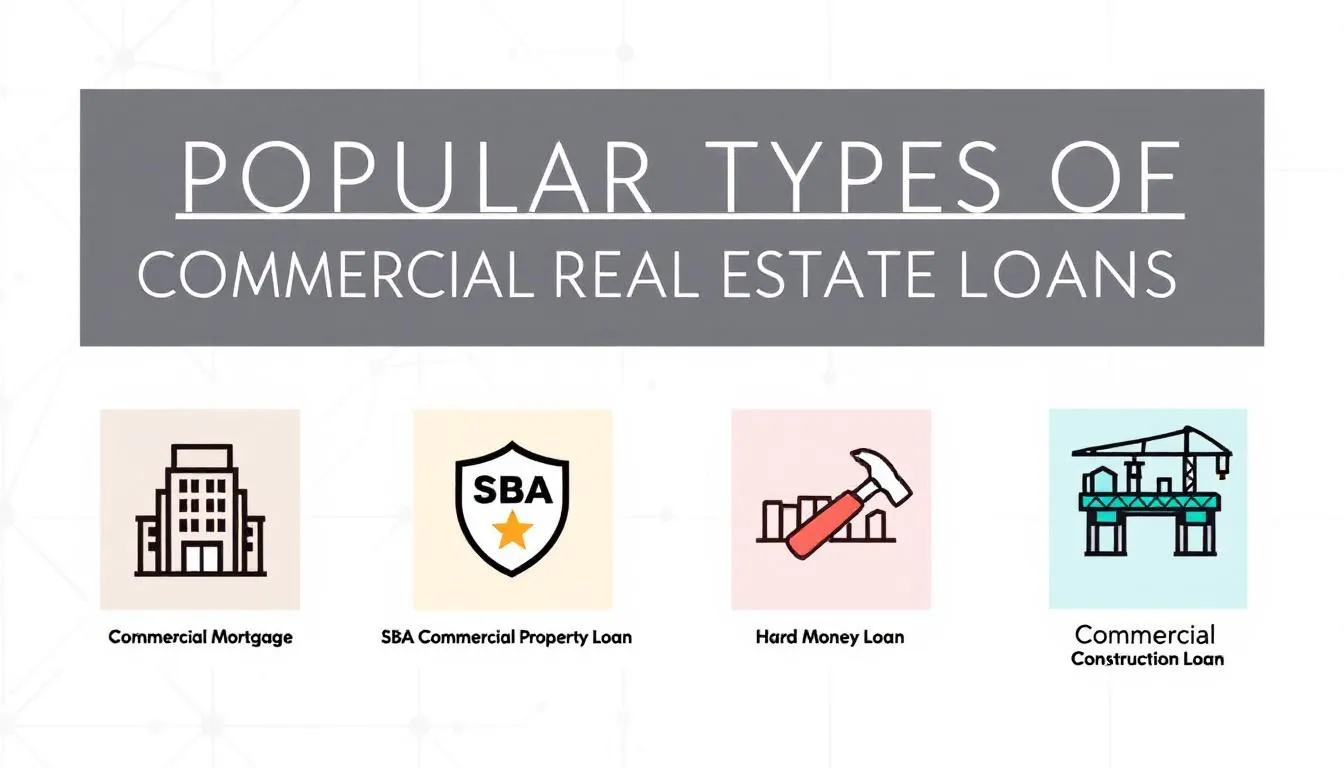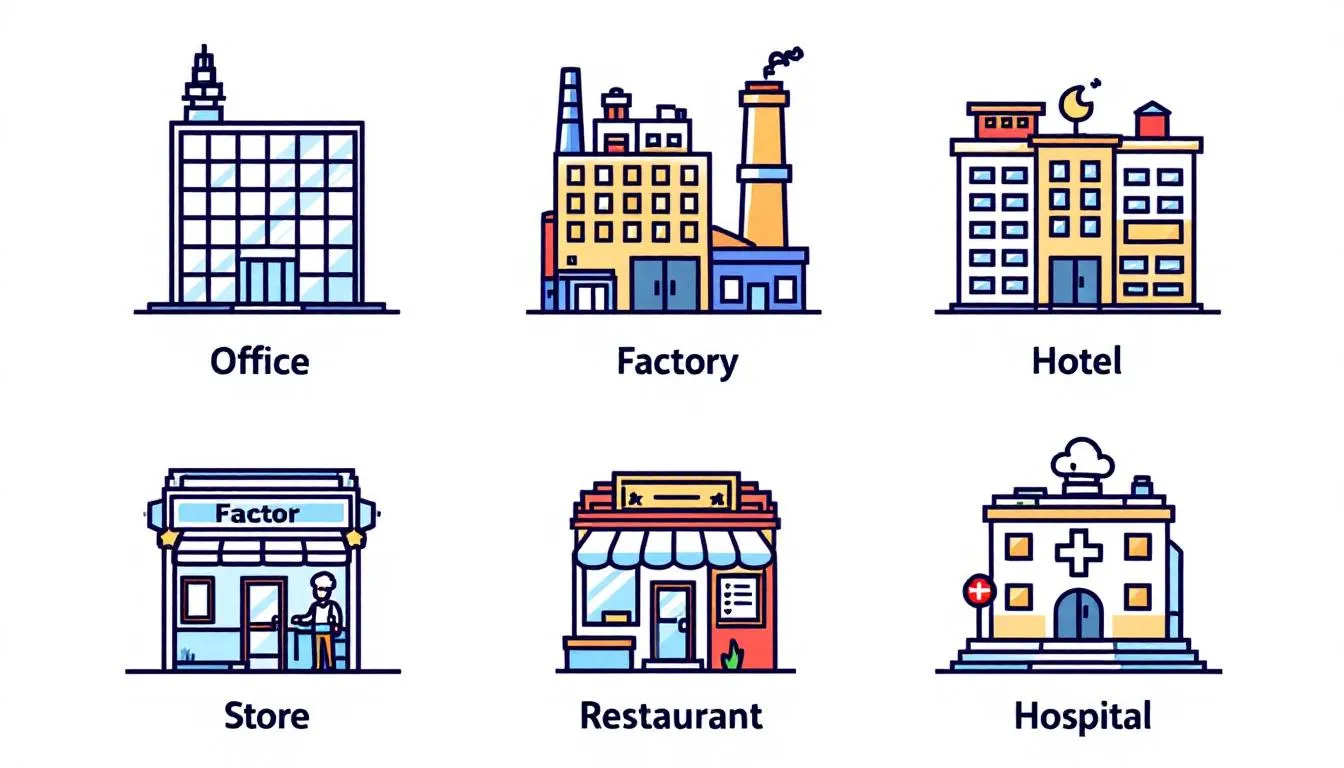What is a Commercial Real Estate Loan?
Commercial real estate loans are a type of financing used to purchase properties, such as office buildings, retail spaces, or warehouses. These loans enable business entities to acquire the necessary space to operate effectively.
One advantage of commercial real estate loans is that they offer flexibility, whether for refinancing existing debts or financing new business ventures. Refinancing enables businesses to secure more favorable loan terms or lower interest rates, ultimately resulting in reduced monthly payments and improved cash flow.
When applying for commercial real estate loans, it’s essential to consider factors such as the required loan amount, the loan terms, and potential lenders. Different lenders offer various options for real estate financing, enabling businesses to select the one that best suits their needs.
Key players in commercial real estate financing include banks, credit unions, and alternative business lenders. Each lender may have different requirements and interest rates when providing these types of loans. Businesses need to assess their needs before deciding on a lender.
How do Commercial Real Estate Loans work?
A commercial real estate loan is a mortgage secured by a lien on commercial property. They come with specific terms, such as the loan amount and repayment period. Different lenders offer various options for commercial real estate loans.
Some commercial lenders may offer flexible repayment terms, while others might require a higher down payment. Borrowers must understand the loan terms before applying for a loan. If the borrower fails to repay the loan, the lender can take legal action to recover the outstanding loan amount.
In most cases, the financed property is the collateral for the loan. Like a residential mortgage, failing to repay the loan could lead to foreclosure and the lender’s repossession of the property.
CRE loans typically have terms ranging from 5 to 20 years, with more extended amortization periods. Interest rates for commercial real estate loans tend to be higher, ranging from 10% to 20% for most borrowers.
Completing a commercial loan application can be done in person or over the phone. Documentation typically required for a commercial loan application includes three to five years of financial statements and income tax returns.
Here are the typical steps in getting a commercial real estate loan.
- Determine your financing needs: The first step in the commercial real estate loan process is to assess the amount of financing you will need for your property purchase or development project. Consider factors such as the property’s purchase price, renovation costs, and any other expenses associated with the project.
- Research lenders: Once you understand your financing needs, research lenders that offer commercial real estate loans. Compare interest rates, terms, and requirements to find a lender that best fits your financial situation and goals.
- Gather documentation: Before applying for a commercial real estate loan, gather all necessary documentation, such as financial statements, tax returns, property information, and business plans. Lenders will require this information to assess your creditworthiness and the project’s viability.
- Submit your loan application: Once you have chosen a lender and gathered all required documentation, submit your loan application. The lender will review your application and may request additional information or documentation before making a decision.
- Underwriting process: After submitting your application, the lender will conduct a thorough underwriting process to assess the risk of lending to you. This process may include a property appraisal, credit check, and evaluation of your financial history.
- Loan approval and closing: If the lender approves your loan application, they will provide you with a loan commitment letter outlining the loan terms. You will then proceed to the closing process, where you will sign the loan documents and officially secure financing for your commercial real estate project.
- Repayment: Once you have closed on your commercial real estate loan, you will begin making regular payments under the terms of the loan agreement. It is essential to manage your finances responsibly to ensure timely repayment and maintain a good relationship with the lender.
What are the most Popular Types of Commercial Real Estate Loans?
Commercial real estate loans come in various types to suit different needs. Here are some of the most popular commercial estate loans.
Traditional Commercial Mortgages
Traditional commercial mortgages are among the most common types of commercial real estate loans. These loans typically have fixed interest rates and terms ranging from 5 to 20 years.
Borrowers can use traditional commercial mortgages to finance the purchase or refinancing of properties such as office buildings, retail spaces, or industrial warehouses. Lenders usually require a down payment of 20-30% and will evaluate the borrower’s creditworthiness and the property’s income potential before approving the loan.
SBA Commercial Property Loans
The U.S. Small Business Administration (SBA) facilitates the SBA loan program. Small business owners must apply to a bank, credit union, or alternative lender for SBA commercial real estate loans. SBA loans can provide funding up to $5 million for small businesses.
To qualify for an SBA loan, a business must have been in operation for a minimum of 2 years and generate at least $250,000 in annual revenue. SBA loans are guaranteed by the government, resulting in lower interest rates for borrowers.
SBA-backed loans tend to have lower interest rates compared to traditional commercial loans. SBA financing may have interest rates ranging from 2.25% to 6% based on the loan’s size and duration. Veterans can benefit from a 25% discount on loan administration or origination fees for SBA loans.
There are two primary types of SBA loans used for commercial real estate.
- SBA 7(a) Loans: SBA 7(a) loans are popular for financing commercial real estate. They offer longer repayment terms and lower down payments than traditional commercial mortgages. They are backed by the Small Business Administration, making them more accessible to small businesses and startups. SBA 7(a) loans can be used for purchasing, refinancing, or renovating commercial properties, providing flexibility for companies looking to invest in real estate.
- SBA 504 Loans: SBA 504 loans are specifically designed to help small businesses acquire commercial real estate. These loans offer long-term fixed-rate financing with low down payments, making them an attractive option for entrepreneurs looking to purchase property for their business. With favorable terms and competitive interest rates, SBA 504 loans provide small business owners with the financial support they need to invest in their future growth and success.
Commercial Bridge Loans
Bridge loans are short-term financing solutions meant to serve as a ‘bridge’ between two financing states. These loans are typically used for real estate transactions or to cover expenses during periods of transition. Bridge loans provide quick access to funds with flexible terms, making them an attractive option for businesses seeking to capitalize on opportunities rapidly without being constrained by traditional lending requirements.
Commercial Construction Loans
Commercial construction loans are vital financial tools for developers looking to finance new construction projects. They provide funding for land acquisition, construction costs, and other expenses associated with building commercial properties.
Construction loans are disbursed in increments known as a draw schedule as construction milestones are met. Lenders typically require detailed project plans, financial statements, and a strong credit history from borrowers. The terms of commercial construction loans can vary, but they usually have higher interest rates and shorter repayment periods compared to traditional mortgages.
Hard Money Loans
Hard money loans are short-term loans based on collateral provided by the borrower. These types of commercial real estate loans are often used by investors or developers who require fast financing and may not qualify for traditional loans due to credit challenges or the nature of their unconventional property types.
Because the property itself secures these loans, lenders focus more on the value of the collateral than the borrower’s credit profile. Private lenders typically fund hard money loans and come with higher interest rates and shorter repayment terms, usually ranging from 12 to 36 months. They’re ideal for time-sensitive opportunities such as fix-and-flip projects or bridge-to-permanent financing situations.
While expensive, hard money loans offer a flexible and fast option when traditional financing is unavailable.
Conduit Loans
Conduit loans are pooled with other loans and sold on secondary markets to institutional investors. Also known as CMBS loans (Commercial Mortgage-Backed Securities), these loans are structured by financial institutions and then securitized into tradable investment products.
Conduit loans are typically used for income-producing commercial properties such as office buildings, retail centers, and multifamily properties. They generally offer competitive fixed interest rates and longer terms, often ranging from 5 to 10 years, with amortization schedules of up to 30 years.
However, these loans can be complex. They include strict servicing agreements and prepayment penalties, such as defeasance or yield maintenance. Still, for borrowers who qualify, conduit loans can offer stable long-term financing for large-scale commercial real estate projects.
Commercial Real Estate Blanket Loans
Commercial real estate blanket loans enable borrowers to purchase multiple properties under a single loan. These loans are ideal for real estate investors, franchise owners, or business owners managing numerous locations who want to consolidate financing into a single mortgage.
Rather than obtaining individual loans for each property, a blanket loan covers all of them, often allowing the borrower to save on closing costs and streamline management. These loans typically include a release clause, which permits the sale of one property in the portfolio without requiring a full repayment of the loan.
Multifamily loans are available for properties with five or more units, classified as commercial loans. Investors seeking to expand their real estate portfolios often utilize blanket loans in conjunction with multifamily financing to efficiently grow their holdings.
How does my business qualify for a Commercial Real Estate Loan?
Credit approval for commercial real estate loans depends on your business’s financial stability and creditworthiness. Lenders assess factors like your business credit score, revenue history, and debt service coverage ratio. Providing detailed information about the property you intend to purchase or refinance is essential.
Different lenders have varying criteria. Some may focus more on the borrower’s credit score, while others prioritize cash flow and business profitability. Understanding each lender’s requirements can help you choose the best fit for your needs.
How do I apply for a Commercial Real Estate Loan?
You can apply for a commercial real estate loan through our network of lenders, utilizing an SBA loan or a business term loan. Follow these steps to apply.
Step 1: Ensure You Qualify
You’ll need a credit score between 650 and 700, as well as a healthy and consistent cash flow. You will also need documentation of the property you’re interested in, such as the address, property type, owner-occupancy ratio, total sale price, plans for renovation, and a list of revenue-generating tenants (if any).
Step 2: Gather Your Documents
Be prepared to provide:
- Driver’s License
- Business license or certificate
- Voided Business Check (for business bank account information)
- Bank Statements
- Credit Report/Statement of Personal Credit History
- Business Tax Returns
- Credit Card Processing Statements
- Personal Tax Returns – 3 Years
- Business Tax Returns – 3 Years
- Business Plan (Not in all cases)
- Personal Financial Statement
- List of Real Estate Owned or Business Leases if applicable
- Debt Schedule/Loan/Rent/Lease Documentation
- Deeds/Title/Ownership documentation for any collateral/Security
- Current Profit & Loss Statements and Balance Sheet Year-to-Date
- A/R and A/P Reports
- United Capital Source 1 Page Application
Step 3: Fill Out the Application
You can begin the application process by calling us or filling out our one-page online application. Either way, you’ll be asked to enter the information from the previous section along with your desired funding amount.
Step 4: Speak to a Representative
Once you apply, a representative will contact you to explain the repayment structure, rates, and terms of your available options. This way, you won’t have to worry about surprises or hidden fees during repayment.
Step 5: Receive Approval
Commercial Real Estate Loans through our network generally take 3-5 weeks to process. Once your file is approved and closed, the funds should be deposited into your bank account within a few business days.
If and when approved for a business term loan, funds should appear in your bank account in 1-2 business days.
What are the benefits of Commercial Real Estate Loans?
Commercial real estate loans offer numerous benefits for businesses looking to acquire an owner-occupied commercial investment property. They typically allow companies to borrow more money compared to traditional residential mortgages, which can be beneficial for purchasing or refinancing commercial properties.
These loans often come with longer repayment terms, which can help businesses manage their cash flow more effectively. Longer terms also mean lower monthly payments, providing more flexibility for businesses.
While interest rates for commercial real estate loans may vary, they are often competitive compared to other financing options. This can result in lower overall costs for businesses over the life of the loan.
Commercial real estate loans come in various forms, such as fixed-rate loans, adjustable-rate loans, and government-backed loans. This diversity enables businesses to select the most suitable mortgage options to meet their evolving business needs.
In some cases, businesses may be eligible for tax benefits related to commercial real estate loans, such as deductions for mortgage interest payments. These tax benefits can help companies to save money and improve their bottom line.
What are the drawbacks of Commercial Real Estate Loans?
Commercial real estate loans come with several drawbacks that borrowers need to consider before taking on this type of financing. These loans typically have higher interest rates compared to residential mortgages, resulting in higher overall borrowing costs.
Lenders often have stringent eligibility criteria for commercial real estate loans, including high credit scores, substantial down payments, and detailed financial documentation. If a borrower cannot make timely payments on a commercial real estate loan, the property is at risk of foreclosure, which can have serious financial consequences.
Commercial real estate loans may offer less flexibility in repayment options and terms than other types of financing, making it challenging for borrowers to adjust to changing financial circumstances. Securing a commercial real estate loan can be a lengthy process that involves extensive documentation and due diligence, potentially delaying the funding for a property purchase or renovation project.
Commercial Real Estate Loans Pros & Cons
Pros:
- Opportunity for high returns on investment.
- Diversification of investment portfolio.
- Potential tax benefits.
- Ability to leverage funds for larger properties.
- Fixed interest rates for predictable payments.
Cons:
- High initial costs and fees.
- Risk of property value depreciation.
- Lengthy approval process.
- Strict qualification requirements.
- Potential for market fluctuations to impact investment profitability.
Frequently Asked Questions
Here are the most common questions about popular types of commercial real estate loans.
How much do Commercial Real Estate Loans cost?
The costs of commercial real estate loans vary based on loan amount, loan term, and interest rates. The purchase price of commercial properties often determines the loan amount.
Costs to consider include:
Interest: You must pay interest on commercial real estate loans, with rates typically ranging from 3% to 7%. The amount of interest paid over the life of the loan varies depending on the loan amount, term, and interest rate. SBA commercial loan rates are pegged to the Prime rate.
Fees: These loans may include origination fees, closing costs, appraisal fees, and other expenses that vary depending on the lender and the specific loan terms.
Down Payment: The down payment for commercial real estate loans typically ranges from 15% to 35% of the property’s purchase price.
What types of Commercial Property can I finance?
Commercial real estate loans enable individuals to finance a variety of commercial properties. Examples include:
- Office buildings
- Retail spaces
- Industrial warehouses
- Apartment buildings
- Hotels and motels
- Mixed-use properties
- Healthcare facilities
- Self-storage facilities
- Restaurants and bars
What’s the difference between Commercial and Residential Real Estate Loans?
Commercial real estate loans are tailored for commercial properties, while residential loans are used for homes. Loan amounts differ significantly, with commercial loans being larger. The application process for commercial real estate loans can be more complex than that for residential mortgage loans.
Lenders assess business credit and potential income from the property when considering commercial real estate loan applications. Loan terms vary widely depending on the lender and borrower’s specific requirements. Unlike residential loans, commercial loan terms can vary significantly among lenders.
Additionally, small business loans for commercial property typically have a loan-to-value ratio (commonly referred to as LTV) of 70%-80%, which is significantly lower than the loan-to-value ratio on residential mortgages.
Can I get a Commercial Real Estate Loan with bad credit?
Having bad credit can make it challenging to secure financing. However, there are still options available for individuals with less-than-ideal credit scores. Some lenders specialize in providing real estate loans to those with poor credit histories.
Exploring different lenders is crucial when seeking a commercial real estate loan with bad credit. Various lenders have different criteria and may be more willing to work with borrowers with lower credit scores. By comparing offerings from many lenders, borrowers increase their chances of finding a suitable loan option that fits their needs and financial situation.
Popular Types of Commercial Real Estate Loans – Final Thoughts
Popular types of commercial real estate loans include SBA loans, bridge loans, and construction loans. Each type offers unique benefits and considerations for borrowers looking to finance their commercial property ventures.
Investors and small business owners must carefully assess their needs and goals to determine the most suitable loan option for their specific situation. By understanding the various types of commercial real estate loans available, borrowers can make informed decisions to support their investment strategies.
Contact us if you have further questions about commercial property lending or would like to apply for a small business loan. Our alternative funding experts can help you find the best options for commercial real estate or other business needs.















